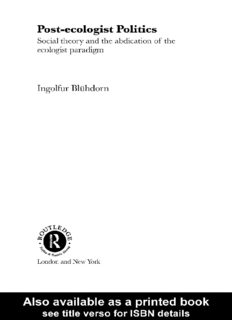
Post-Ecologist Politics: Social Theory and the Abdication of the Ecologist Paradigm (Routledge Innovations in Politicaltheory) PDF
Preview Post-Ecologist Politics: Social Theory and the Abdication of the Ecologist Paradigm (Routledge Innovations in Politicaltheory)
Post-ecologist Politics Since the late 1980s, ecological thought and the European eco-movement have gone through a phase of fundamental transformation which has been widely acknowledged, but not yet theorised in any satisfactory way. Numerous environ- mental sociologists have suggested that ecological thinking has come to maturity and that ‘ecologism’has firmly established itself as an independent ideology.This book counters such assertions,controversially suggesting that,rather than being the vanguard of a future sustainable society, the eco-movement has become a rear- guard battle defending modernist ideals which have largely lost their validity and attractiveness. Challenging the increasing reliance on predominantly empirical and directly policy-oriented approaches, Post-ecologist Politics insists on the indispensability of theoretical models which may help us to interpret societal processes including environmental change and the multi-level discourse about it.Through the use of critical theory and systems theory (particularly the work of Luhmann),Blühdorn reinterprets the eco-movement and devises a theory of ‘post-ecologism’.This book seeks to explain why radical ecological criticism has had so little impact on con- temporary society.It offers a challenging theoretical critique of ecological thought itself. Post-ecologist Politicsis fascinating and thought-provoking reading for all students and scholars interested in the politics and philosophy of the eco-movement. Ingolfur Blühdornis a Lecturer in European Politics at the University of Bath. His previous publications include The Green Agenda:Environmental Politics and Policy in Germany (co-edited with Frank Krause and Tom Scharf). Routledge Innovations in Political Theory A Radical Green Political Theory Alan Carter Rational Woman A Feminist Critique of Dualism Raia Prokhovnik Rethinking State Theory Mark J.Smith Gramsci and Contemporary Politics Beyond Pessimism of the Intellect Anne Showstack Sassoon Post-ecologist Politics Social Theory and the Abdication of the Ecologist Paradigm Ingolfur Blühdorn Post-ecologist Politics Social theory and the abdication of the ecologist paradigm Ingolfur Blühdorn London and New York First published 2000 by Routledge 11 New Fetter Lane,London EC4P 4EE Simultaneously published in the USA and Canada by Routledge 29 West 35th Street,New York,NY 10001 Routledge is an imprint of the Taylor & Francis Group This edition published in the Taylor & Francis e-Library, 2002. © 2000 Ingolfur Blühdorn All rights reserved.No part of this book may be reprinted or reproduced or utilised in any form or by any electronic, mechanical,or other means,now known or hereafter invented,including photocopying and recording,or in any information storage or retrieval system,without permission in writing from the publishers. British Library Cataloguing in Publication Data A catalogue record for this book is available from the British Library Library of Congress Cataloging in Publication Data Blühdorn,Ingolfur. Post-ecologist politics:social theory and the abdication of the ecologist paradigm/Ingolfur Blühdorn. p.cm.– (Routledge innovations in political theory) Includes bibliographical references (p.). 1.Green movement. 2.Environmental policy. I.Title.II.Series. GE195 .B58 2000 363.7′0525–dc21 00-032173 ISBN 0–415–19203–X(Print Edition) ISBN 0-203-20702-5 Master e-book ISBN ISBN 0-203-20705-X (Glassbook Format) For Annette The environmental crisis is in crisis.Someday someone will attempt to establish a career by demonstrating that it only ever existed in people’s heads. (Ulrich Beck) We here propose to do just what Copernicus did in attempting to explain the celes- tial movements.When he found that he could make no progress by assuming that all the heavenly bodies revolved round the spectator,he reversed the process,and tried the experiment of assuming that the spectator revolved, while the stars remained at rest. (Immanuel Kant) Contents Acknowledgements x Preface xi PART I Preliminaries 1 1 Ecological concern and theoretical enquiry 3 1.1 Sociological and philosophical abstinence 4 1.2 The non-negotiability of nature 5 1.3 The false promise of empiricism 9 2 Ecology in crisis 13 2.1 An ecological ideology? 17 2.2 The eco-movement in transformation 23 2.3 A rearguard battle? 30 3 Towards post-ecologism 35 3.1 The abolition of nature 37 3.2 Ecological constructionism 40 3.3 A post-ecologist research agenda 48 PART II Understanding ecologism– critical theory 55 4 Alienation and reconciliation– Horkheimer and Adorno 57 4.1 The Self and the Other 60 viii Contents 4.2 The dialectic of enlightenment 64 4.3 The project of reconciliation 66 4.4 The pre-ecological imperative 70 4.5 Lessons to learn 73 4.6 Theoretical limitations 79 5 Pluralisation and reflexivity– Ulrich Beck 81 5.1 The risk society 83 5.2 Reflexive modernisation and second modernity 87 5.3 Environmental problems and systemic problems 90 5.4 The reinvention of politics 91 5.5 A theory of societal self-critique? 97 5.6 Final assessment 99 PART III Deconstructing ecologism– systems theory 105 6 Autopoietic systems and functional differentiation– Niklas Luhmann I 107 6.1 Systems and environments 110 6.2 Communication and meaning 112 6.3 Autopoiesis and self-referentiality 115 6.4 Temporalization and differentiation 117 6.5 Operation and observation 120 6.6 Provisional assessment 122 7 Ecological communication– Niklas Luhmann II 126 7.1 A revised concept of the environment 128 7.2 A revised understanding of the environmental problem 130 7.3 Confronting environmental problems 133 7.4 Ecological communication as a function system 135 7.5 The code of the eco-movement 139 7.6 Eco-ethics and the communication of Angst 143 7.7 Conclusions 145 Contents ix PART IV Post-ecologism 149 8 Ecology without identity 151 8.1 Core ingredients 153 8.2 Post-ecologist explanations 159 8.3 Post-ecologist perspectives 165 9 Avoiding ecologist fallacies 173 9.1 Is post-ecologism uncritical? 174 9.2 Is post-ecologism anti-ecological? 180 9.3 Is post-ecologism pessimistic or cynical? 185 10 Managing the transition to post-ecologist politics 190 10.1 Ecological modernisation and ecological modernisation theory 191 10.2 The ecologist critique of ecological modernisation 193 10.3 A post-ecologist reassessment of ecological modernisation 196 Epilogue 201 References 204 Index 215
Description: